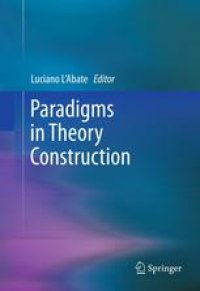
Ebook: Paradigms in Theory Construction
- Tags: General Psychology, Philosophy of Science
- Year: 2012
- Publisher: Springer-Verlag New York
- Edition: 1
- Language: English
- pdf
Within the field of psychology there is a proliferation of paradigms, theories, models, and dimensions without an underlying conceptual framework or theory. This conclusion has been reached by representatives of many different psychological specialties. In response to this inconsistency this book presents a hierarchical framework about important theoretical issues that are present in psychological thinking. These issues concern definitions of three major theoretical concepts in theory and practice: (a) paradigms, (b) theories, and (c) models. It focuses on defining, comparing, and contrasting these three conceptual terms. This framework clarifies differences among paradigms, theories, and models, terms which have become increasingly confused in the psychological literature. Paradigms are usually confused with theories or with models while theories are confused with models. Examples of misuses of these terms suggest the need for a hierarchical structure that views paradigms as conceptual constructions overseeing a variety of psychological theories and verifiable models.
Paradigms in Theory Construction
Luciano L’Abate, editor
Without the framework of the paradigm supporting layers of theories,models, and data, our concept of science, and its shared mode of scholarly thought, would not exist. The concept is readily understood. But how did we get there?
Paradigms in Theory Construction classifies the collective worldviews that inform paradigms and clarifies the relationships between them, theories, and models in psychology, the hard sciences,and the social sciences. The book skillfully merges the philosophy of science with the history of scientific inquiry to explain how ideas take hold among populations,how paradigms are structured, whether they are based in logic, and under what circumstances paradigm shifts occur. Rich with historical and contemporary examples across disciplines, chapters examine the function of the paradigm for the community of scholars in major arenas of scientific pursuit, among them:
- The impact of paradigms on the evolution of science.
- Paradigms in educational theory and practice.
- Artistic, verbal, and visual paradigms.
- General-integrative paradigms, including biopsychosocial, interbehavioral, constructionism, and materialism.
- Particular-specific paradigms: humanism, behaviorism, existentialism, and others.
- The emergence of reason, intelligence, and language.
- Among all the paradigms included in this volume, information processing has become the reigning paradigm for this century.